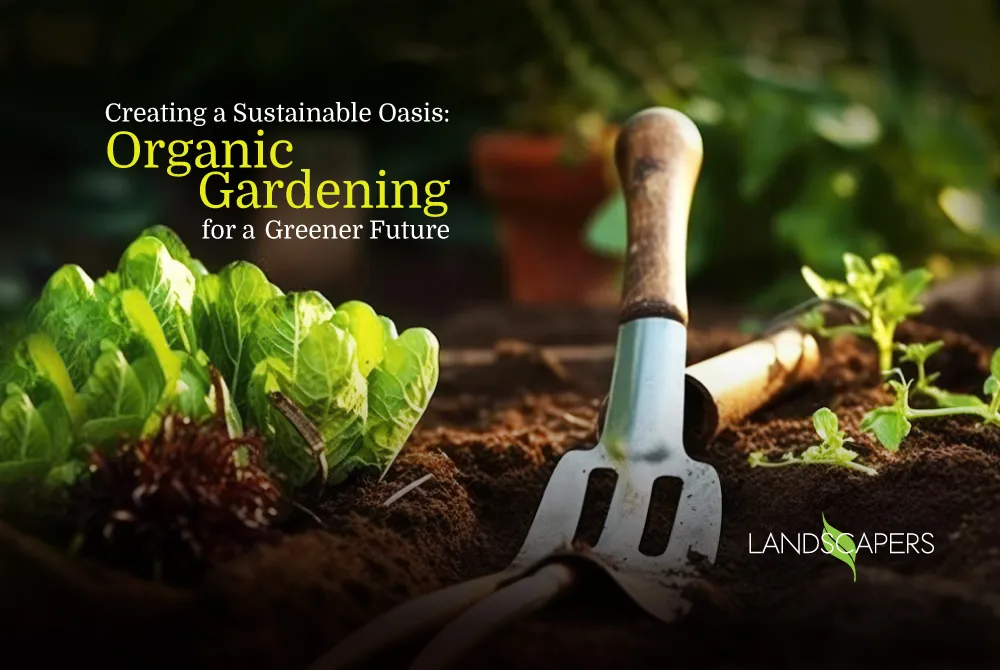
Creating a Sustainable Oasis: Organic Gardening for a Greener Future
In an era where sustainability and environmental consciousness are at the forefront of our collective consciousness, organic gardening has emerged as a beacon of hope for a greener, healthier planet. This eco-friendly gardening approach not only nurtures the earth but also offers a myriad of benefits for homeowners, from lush landscapes to nourishing, pesticide-free produce. Put your cottagecore cap on, as we explore simple interventions in organic gardening that have been used for centuries and discover how it contributes to a more sustainable future.
The Organic Gardening Paradigm
Organic gardening is not a new trend emerging on social media; it has been a way of life for many people for centuries. The only difference is that urban residents have only caught on to the benefits of organic gardens recently, as it allows perfect harmony of the urban scene with nature’s rhythms. At its core, organic gardening eschews synthetic fertilizers and pesticides, opting instead for natural alternatives that promote soil health, reduce chemical runoff, and safeguard our precious pollinators. The result is a thriving garden that’s not only visually appealing but also environmentally responsible.
Sustainable Landscaping with Organic Gardening
Landscaping is an integral part of organic gardening, as it aims to create a harmonious environment that supports biodiversity and conserves natural resources. Here are some key aspects of sustainable landscaping within the realm of organic gardening.
Native Plants
Incorporating native plants into your garden is a cornerstone of sustainable landscaping. Native species are adapted to the local climate and require less water and maintenance. Their presence also attracts local wildlife, enhancing the ecological balance of your garden.
Soil Health
Healthy soil is the foundation of any successful garden, and organic gardening prioritizes soil health. Techniques such as composting, mulching, and cover cropping replenish nutrients and improve soil structure. This not only fosters robust plant growth but also prevents erosion and reduces the need for chemical fertilizers.
Water Conservation
Efficient water use is a crucial element of sustainable landscaping. Drip irrigation, rain barrels, and xeriscaping (a landscaping technique that uses drought-resistant plants) are all strategies that can be employed in an organic garden. These methods reduce water waste and the overall environmental impact of gardening.
Biodiversity
A sustainable garden is one that teems with life. By planting a variety of flowers, shrubs, and trees, you create habitats for birds, insects, and other wildlife. Encouraging biodiversity not only adds beauty to your landscape but also helps control pests naturally, reducing the need for chemical pesticides.
The Organic Garden as an Ecosystem
An organic garden is not just an assortment of plants; it’s a thriving ecosystem. Each component plays a crucial role in maintaining the delicate balance within your garden.
Beneficial Insects
Organic gardening promotes the presence of beneficial insects like ladybugs, lacewings, and bees. These insects help pollinate plants and control harmful pests, acting as natural pest management.
Composting
Composting is the heart of organic gardening. It transforms kitchen scraps and yard waste into nutrient-rich compost that enriches the soil. This process reduces waste sent to landfills while improving soil health.
Companion Planting
Strategic planting of complementary plants can deter pests and enhance growth. For example, planting marigolds near tomatoes can help deter nematodes, while beans can enrich the soil with nitrogen for neighboring plants.
Organic Fertilizers
Instead of synthetic fertilizers that can leach into groundwater and harm aquatic ecosystems, organic gardeners use natural fertilizers like compost, bone meal, and fish emulsion to nourish their plants. These materials release nutrients slowly, promoting long-term soil health.
Food Security
Beyond its landscaping aspects, organic gardening plays a significant role in ensuring food security. Growing your own organic produce not only reduces your carbon footprint by eliminating the need for transportation but also guarantees that your food is free from harmful chemicals. It’s a small step that can make a big difference in the quest for a greener future.
The Future Is Green
As we look ahead to a more sustainable future, organic gardening emerges as a beacon of hope. It’s not just about growing beautiful landscapes; it’s about creating thriving ecosystems that contribute to a healthier planet. By embracing organic gardening practices, we can protect our environment, support biodiversity, and nourish ourselves with fresh, chemical-free produce.
Organic gardening should be more than a hobby; it should drive your passion towards a greener future. It offers a holistic approach to landscaping, emphasizing native plants, soil health, water conservation, and biodiversity. By understanding the interconnectedness of all elements within our gardens, we can create sustainable oases that benefit both us and the planet. As we nurture our gardens organically, we also nurture the hope of a brighter, more sustainable tomorrow.

